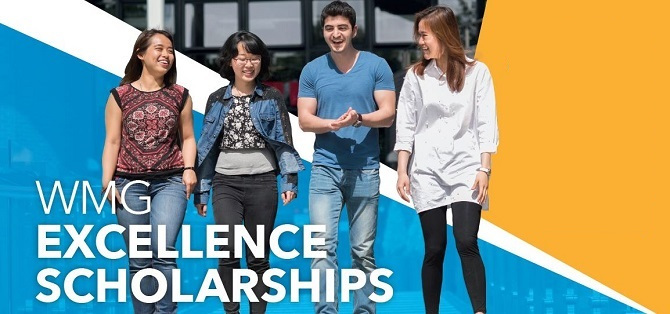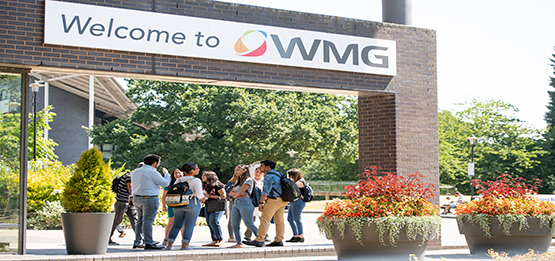Games Engineering (MSc) (2023 Entry)

Explore our Games Engineering taught Master’s Degree.
The Computer Games industry is one of the most exciting and dynamic growth industries today. Yet recruiting graduates with the specific skills required is one of the industry’s greatest challenges. Games Engineering MSc, taught in the interdisciplinary WMG department, is designed to address these challenges, and train the games engineers and developers of the future.
Course overview
As a Master’s student of Games Engineering, you will be engaged in one of the most performance-driven elements of computer science, and will be well prepared to launch your career as an expert developer in the multi-billion pound computer games industry.
Video game development is a particularly complex software engineering process, requiring expertise in a number of wide ranging areas including high-performance graphics, programming, data structures, physics, acoustics, Artificial Intelligence (AI), machine learning, networking, modelling and rendering.
Throughout the course, you will be trained in the complex game development process, learning the fundamental and theoretical aspects of how to create game engines from the ground up, as well as working with established game engines (i.e. Unreal, Unity) to understand the intricacies of their capabilities and limitations.
Fundamental to becoming an expert developer is having deep understanding of algorithmic concepts and high-level programming languages, so, through this degree, you will not only master languages like C++ and python, but will form a conceptual understanding of computing principles with programming as a vehicle to grasp these concepts.
Visual computing, specifically the domain of computer graphics, is a fundamental discipline for the development and implementation of video games. Not only is it key within games engineering, but is ubiquitous across modern commercial, industrial and education landscapes.
Developed in collaboration with Warwick’s Visualisation Research Group, this Master’s degree draws on particular expertise in Visual Computing, including computer graphics, vision, imaging, distributed and parallel systems, Human Computer Interaction, and AI.
It is delivered in the multidisciplinary WMG department, Warwick’s largest academic department with 1300 full-time MSc students across a portfolio of courses, and 34 research groups driving over 40% of all research conducted at the university.
General entry requirements
Minimum requirements
2:1 undergraduate degree (or equivalent) in a related STEM subject (Computer Science, Engineering, Technology, Maths).
English language requirements
You can find out more about our English language requirementsLink opens in a new window. This course requires the following:
- Band A
- IELTS overall score of 6.5, minimum component scores not below 6.0
International qualifications
We welcome applications from students with other internationally recognised qualifications.
For more information, please visit the international entry requirements pageLink opens in a new window.
Additional requirements
Candidates with professional experience should include their CV with their application.
Core modules
As part of the MSc in Games Engineering, all students are required to study the following core modules:
- Fundamentals of Games Research, Development and Management (30 CATS)
- Programming and Fundamental Algorithms (15 CATS)
- Computer Graphics (15 CATS)
- Advanced Computer Graphics (15 CATS)
- Games Engineering (15 CATS)
- Games Engine Design and Development (15 CATS)
Elective modules
Alongside your core modules, you will need to select an elective module so that your taught modules equate overall to 120 CATS (or 1200 hours of learning).
Your elective module list will be shared at the start of the academic year and will include modules such as:
- Innovative Simulation Design and Development (15 CATS)
- Machine Intelligence and Data Science (15 CATS)
Teaching
This course has two components – a taught component accounting for two-thirds of your time and effort, and a research component accounting for one-third.
For the taught component, we blend synchronous and asynchronous learning delivered through lectures, seminars, lab work, syndicate exercises, simulations, case studies, and professional portfolio development.
Our teaching faculty has extensive industry and research experience, with guest speakers from industry bringing real-world insight into your learning experience.
In addition to your taught modules, you will undertake a major project as part of your Masters’ degree. This is nominally 600 hours (60 CATS points) of learning, mainly taking place during the Spring and Summer terms. You will be expected to engage regularly with your Project Supervisor and to provide progress updates and drafts of your work to an agreed schedule. The outputs of your academic year will also form the basis of an industry standard portfolio.
Class sizes
This course can accommodate up to 25 students.
Typical contact hours
Module delivery patterns vary, but most will be delivered in a short learning block of up to 4 weeks, allowing you to focus on one module at a time.
Each 15 CATS module nominally accounts for 150 hours, which includes scheduled classroom and lab time, as well as your independent study and assessments.
Assessment
Modules are predominantly assessed by way of written Post Module Assignments (PMA), but assessment can also be in other formats. Most modules will also have a degree of In-Module Assessment (IMA), which will vary by module and may take the form of presentations, on-line tests, self-reflection or a range of other methods.
For the research component, you will undertake a major project. Project submission is likely to include both a written and a presentation element, accounting for 33% of your overall academic grade.
Reading lists
Most departments have reading lists available through Warwick Library. If you would like to view reading lists for the current cohort of students you can visit our Warwick Library web pageLink opens in a new window.
Your timetable
Core modules will be allocated to students at the end of the first week of term - you will then be able to view your individual module schedule for the rest of the year via the WMG module selection system.
Elective modules will be bookable through the same system later in the term.
Modules will include scheduled classroom time and online sessions as well as your independent study and assessments, and will usually be delivered within a 4 week timeframe. Occasional classes and study skills sessions may be held at weekends or in the evenings.
As a Masters student, you are expected to manage your own time appropriately. On average, you are expected to commit 38-40 hours of study each week, in order to successfully achieve your Master’s degree.
This is a full-time postgraduate course - undergraduate term dates do not apply. Whilst there are no holidays as such, there will be no teaching scheduled when the University is officially closed, during the two weeks over Christmas and New Year.
Careers
The academic, technical, and professional expertise you will gain on this course are highly sought by multi-billion pound computer games industry. We would expect graduates to secure senior technical roles within the industry where there is such a huge demand for talent.
The skills you will develop are also highly transferable into other sectors - from the film industry through to the finance sector - where visual computing, advanced programming, and machine learning are widely required.
Throughout the course, you will develop an industry standard portfolio to present to future employers.
You will enjoy networking opportunities with leaders in the games industry, and our close proximity to Leamington Spa, nicknamed ‘Silicon Spa’ due to the abundance of Game Companies located in the area, means excellent access to many of the industry leaders as well as rising stars, including Codemasters, SEGA, Ubisoft, Lab 42, Midoki, and Pixel Toys .
WMG at Warwick
Having forged strong links with global companies through 42 years of collaborative research and development, we really understand the global market you’ll be operating in, and have designed our programmes to match.
Find out more about us on our websiteLink opens in a new window
Our courses
- Cyber Security Engineering (MSc)
- Cyber Security Management (MSc)
- e-Business Management (MSc)
- Engineering Business Leadership (MSc)
- Engineering Business Management (MSc)
- Games Engineering (MSc)
- Healthcare Operational Management (MSc)
- Innovation and Entrepreneurship (MSc)
- Intelligent Manufacturing Systems (MSc)
- International Trade, Strategy and Operations (MSc)
- Programme and Project Management (MSc)
- Smart, Connected and Autonomous Vehicles (MSc)
- Supply Chain and Logistics Management (MSc)
- Supply Chain Leadership (MSc)
- Sustainable Automotive Electrification (MSc)
Our Postgraduate Research degrees
Visiting WMG
There are a number of different ways to visit the University of Warwick throughout the year. We host bespoke PG visits, where you can talk directly with your chosen department and explore our campus through a personalised tour. WMG also organises events for prospective students including a weekly Live Chat so you can connect directly with the department to speak with staff and students from WMG. For more about university wide open days and tours, visit our Postgraduate Visits page.
Scholarships and bursaries

Scholarships and financial support
Find out about the different funding routes available, including; postgraduate loans, scholarships, fee awards and academic department bursaries.

WMG funding opportunities
WMG will be awarding over £1million in scholarships and bursaries to students commencing study on our full-time MSc programmes

Living costs
Find out more about the cost of living as a postgraduate student at University of Warwick.
Additional funding information
We have a number of research projects available which are fully or partially funded. The majority of these are for UK/EU applicants, though occasionally we advertise positions that are also open to overseas applicants. Please refer to specific project descriptions for details. See our Research Degree opportunities here.

Find out how to apply to us, ask your questions, and find out more.

Taught course applications
Here is our checklist on how to apply for taught postgraduate courses at Warwick.

Application advice from WMG
Please see the WMG department web pages for specific application advice and information.

After you’ve applied
Find out how we process your application.

Applicant Portal
Track your application and update your details.

Admissions statement
See Warwick’s postgraduate admissions policy.

Join a live chat
Ask questions and engage with Warwick.
Postgraduate Open Day
Our Postgraduate Virtual Open Day will help you find out more about your course of interest, as well as general topics like applying to Warwick, accommodation, careers and funding.Postgraduate fairs
Throughout the year we attend exhibitions and fairs online and in the UK. These events give you the chance to learn about our Master's and PhD study routes, and the wider context of postgraduate study.
Live chats
Every week, you can connect directly with representatives from Warwick, who will be answering your questions on applying to and studying postgraduate studies at Warwick.
Departmental events
Some academic departments hold events for specific postgraduate programmes, these are fantastic opportunities to learn more about Warwick and your chosen department and course.
Connect with us
Want to hear more about postgraduate study at Warwick? Register your interest and find out more.
